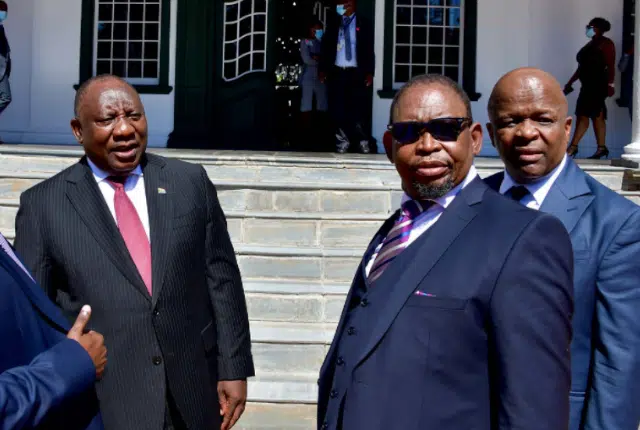
Push to scrap free water, electricity and other perks for ministers in South Africa
Opposition party, the Democratic Alliance (DA), wants to mobilise civil society groups to march on government ministers’ private residences if president Cyril Ramaphosa does not scrap the controversial ministerial handbook.
The party has delivered an ultimatum to the president to do away with ministerial perks and luxuries enjoyed at taxpayers’ expense by the end of the week (21 October), failing which it will march on Bryntirion Estate in Pretoria.
Bryntirion Estate is the official residence of the president and various cabinet ministers. The estate is on the same grid as the Union Buildings – a national key point – and as such, does not experience load shedding along with the rest of the country.
Reports over the last two weeks have highlighted other luxuries and perks afforded to ministers by the ministerial handbook, including free water and electricity – paid for by taxpayers – access to a host of aides, and the freedom to purchase luxury vehicles up to R800,000.
Union federation Cosatu has also called for the scrapping of the perks, calling them “vulgar and tone deaf” while the country suffers under load shedding, water shortages and a growing cost of living crisis underpinned by high levels of unemployment.
“It is extremely insensitive for this administration to cushion off the members of the executive while imposing extreme sacrifices on the workers and the unemployed,” the union said.
“These are the same people who have mismanaged the power utility to the ground over the past sixteen years, and this has seen consumers being subjected to continuous double-digit and above-inflation electricity tariff hikes. This is the very same executive that has mismanaged the water crises in South Africa, leading to water shedding and water restrictions.”
The DA, meanwhile, has approached the office of the Public Protector over the apparent fact that there is no law that provides for the existence of the handbook.
“In our view, it is also clearly inconsistent with the Constitution that the president can hide his milking of taxpayers from Parliament,” the party said. It noted that changes were made to the handbook in April 2022, which – while reported on – were not presented or made public in any detail.
“That the President has dictatorial powers to force taxpayers to pay millions more for ministerial perks without even having to report this to Parliament is an assault on our democracy,” the party said.
Following public outrage over the perks, minister in the presidency, Mondli Gungubele, tried to justify the perks, telling SAfm that ministers’ positions were ‘insecure’ and that they could lose their job at any moment.
Because of this, many are not permanently residing in official homes and have to purchase their own houses, he said. He added that ministers had faced mounting utility bills and other issues, which provoked the changes.
Despite ministers and deputy ministers earning between R2 million and R2.4 million a year – or R200,000 a month – Gungubele argued that budgets were tight, and ministers having to be available 24/7 – influenced finances, particularly with things like their medical aid contributions.
Gungubele said that only official residences near the union buildings were exempt from load shedding and that all other minister residences get load shed with the rest of the country.
Read: South Africa’s millionaire ministers get even more perks – paid for by you



